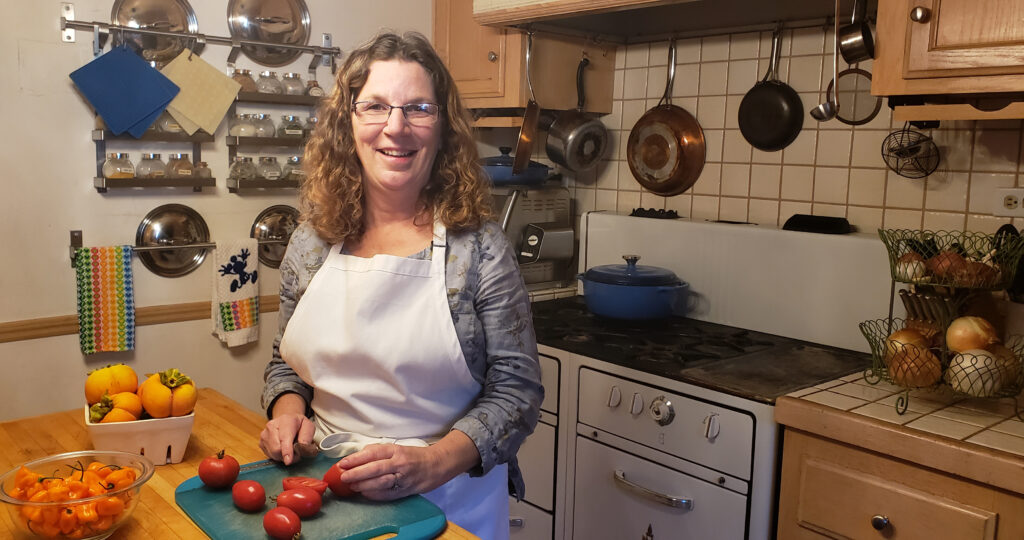Vallejo woman opens one of Solano County’s first legal home-based restaurants

The following article was originally published in the Fairfield Daily Republic
Vallejo native and resident Melissa Edwards, a self-described foodie who “has it bad,” is the owner/operator of one of Solano County’s first legal, home-based restaurants – Enchanted Cottage Kitchen.
Edwards, who crafts a rotating, seasonal menu of home-made “classic comfort foods,” took all the required courses to earn a food manager certificate, passed all the required inspections and is dishing up chicken pot pies, sloppy joes, Swedish meatballs and an appropriate vegan option.
“But, these will be a little healthier, with ground turkey and with carrots for some of the sweetening and home-grown herbs and other ingredients,” she said.
Edwards, 58, opened her doors Nov. 6. There will be lighter fare in the spring and summer, she said.
All this, and the eatery’s name, make perfect sense to anyone who knows Edwards and her family, whose fairytale-looking Tudor-style home’s front yard was selected a few years ago by Sustainable Solano to plant and maintain a pollinator garden/food forest/wildlife habitat, from which many of her ingredients come. The family also cares for eight chickens that produce fresh eggs.
“We’re all about food around here,” she said. “Always have been.”
The love of cooking for people is also a longstanding family tradition, she said. So, when she heard about the new state laws allowing home-based “restaurants,” she jumped at it.
“For me, this is how I show I care,” she said. “Like we take in California Maritime Academy students every year, and I feed them stuff I make from scratch because I want them to feel part of the family. When I put on parties for the kids, I like to find a theme and come up with food that fits. It’s what I do.”
Edwards said she ran across the opportunity on social media.
“I saw something about a class on Facebook, and I’d been thinking of doing a cottage business for jams and stuff, but when I saw about this opportunity, I thought, ‘This is great for me,’ ” she said. “I can cook for people without the overhead of a brick and mortar restaurant, and that’s what I like to do, so this is made for me.”
The home-based restaurant became possible in California with the passage of Assembly Bill 626 – The Homemade Food Operations Act – in 2019.
The first of its kind in the country, the law has a major caveat: counties have to opt in, and Solano County did so in March, according to the Solano Small Business Development Center. Designed to give cooks a chance to see if they might want to open an actual restaurant, the bill builds on the 2012 California Homemade Food Act. That law allows people to prepare and sell low-risk food items like jams or frozen foods from their home.
“Home chefs will soon be able to operate a ‘mini restaurant’ from their kitchens, as Solano County becomes one of only several counties in California to offer certification in Microenterprise Home Kitchen Operation,” the Solano Small Business Development Center reported in May. “More commonly known as MEHKO, this permit will allow chefs to prepare, cook and serve food prepared in their home kitchen directly to consumers, either through delivery, take-out or dine-in at the house. Food must be cooked and served on the same day and approved MEHKO’s can serve up to 30 meals a day, or 60 meals per week.”
Solano County began the opt-in process in early 2020, but the Covid-19 pandemic stalled it – until the Solano County Board of Supervisors officially approved it in March.
Supervisor Erin Hannigan, who represents Vallejo, said she thinks the new law will be a boon for the county and the individuals who decide to give it a shot.
“Melissa has completed the Micro Enterprise Home Kitchen Operation requirements through Solano County Environmental Health Division. MEHKOs are administered through the county and not the cities, per the California statute that regulates them,” Hannigan said.
The board adopted the MEHKO ordinance during the height of the pandemic “with the idea that we would open the program up for certification when the virus load was reduced,” she said.
“Personally, I believe a MEHKO is a low barrier entry into the restaurant business but not a replacement for our brick and mortar restaurants who invest lots of money in their location, hiring employees and are required to follow strict environmental health requirements,” Hannigan said. “The MEHKO operator has minimal permit requirements for food safety, minimal startup cost as the kitchen is their home kitchen and is not subject to unannounced or frequent visits by the environmental health inspector unless there are complaints.”
MEHKOs can help aspiring restauranteurs share their food, create a following and transition to a more permanent dine in/pick up location in a commercially zoned neighborhood, she said.
There are restrictions for home kitchens, like they can sell no more than 60 meals in a week, generate a maximum of $50,000 annual income and there are advertising limitations relative to signage, Edwards and Hannigan said.
And while all the tests and inspections – water temperatures, refrigerators, freezers, sanitizing protocols – made her nervous, Edwards said she passed them all easily, owing to her doing her homework and being prepared.
“There’s a process for this,” Edwards said. “There’s a third-party website on which people can order from you – Foodnome is the one I’m using – and you order online on this site. They handle the money and pay the sales tax.”
There is at least one other MEHKO in Solano County – in Benicia – and others are likely in the works, Edwards and Hannigan said.
Among the restrictions for a MEHKO are ones prohibiting leftovers or early prep, and foods must be kept hot – no reheating allowed.
“What you serve has to be cooked and served the same day – no leftovers,” Edwards said. “So, if there are leftovers, my adult kids will come over and help finish those off. So, they help decide what to cook.”
Edwards plans to rotate seasonally appropriate meals – a main meat dish, a main veggie dish, one veggie side and a dessert . . . “because I’m a bubbe (grandma in Yiddish), and I believe people should eat their vegetables,” she said.
One thing Edwards said she thinks these new, small, home-based eateries will be able to offer is a healthier fast-food-type option.
“This will be good for the community, especially in Vallejo, where there’s so much fast food, but this will be good for you and made with care, and you can pick it up like a drive-thru,” she said.
Customers will only be told the Enchanted Cottage address once they’ve ordered and paid, and will be able to click something on their phone to let Edwards know they’re ready to pick it up. Edwards is cooking a couple of days a week to start, she said, as she has bubbe duty three days a week.
“I think this is meant to be a stepping stone for someone who wants to see if this is something they really like doing, and it will probably help to convince potential lenders or investors if they want to grow into a brick and mortar restaurant. That’s my opinion,” she said. “I hope we get a lot more of these in the county, so when people are hungry they can look on Foodnome and see what’s good, that’s homemade, with good ingredients, and made with care, and you can taste that.”


